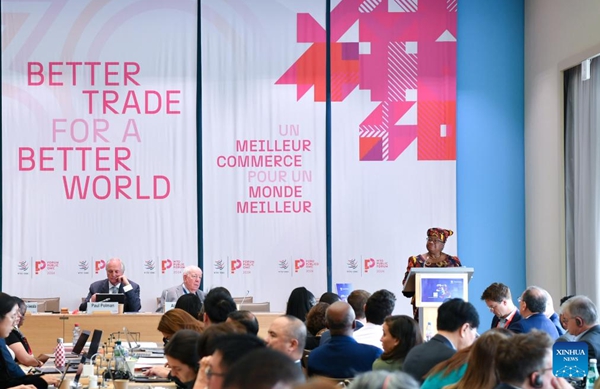WTO Public Forum 2024 focuses on "re-globalization"

WTO Director-General Ngozi Okonjo-Iweala (at the podium) speaks at the WTO Public Forum 2024 in Geneva, Switzerland, on Sept. 10, 2024. (Xinhua/Lian Yi)
GENEVA, Sept. 10 (Xinhua) -- The World Trade Organization (WTO) Public Forum 2024 opened in Geneva on Tuesday, highlighting the theme "Re-globalization: better trade for a better world."
This year's event aims to explore how re-globalization can make trade more inclusive and ensure that more people benefit from it.
WTO Director-General Ngozi Okonjo-Iweala said international trade helps narrow income gaps between economies and promotes global economic inclusivity, citing findings from the recently released World Trade Report 2024.
Between 1995 and 2023, global per capita income, adjusted for inflation, grew by about 65 percent; the per capita income of lower middle-income economies almost tripled, according to Okonjo-Iweala.
"Poor countries narrowed the income gap with rich ones for the first time since the Industrial Revolution," she said.
However, the director-general pointed out that many poor countries, particularly in Africa, Latin America, and the Middle East, remain on the margins of global trade. They were lagging on income convergence even before the pandemic struck, she said.
In some high-income countries, challenges such as high trade costs, limited access to information, mismatched job skills, and lack of financing opportunities have left many feeling left behind by globalization. This, she noted, has intensified political backlash against international trade.
Okonjo-Iweala stressed that protectionism is not an effective path towards inclusivity. Instead, more and better trade is the path to bring people and places from the margins to the mainstream of the global economy.
WTO Chief Economist Ralph Ossa added that a comprehensive strategy is required to further enhance trade inclusivity and address income gaps between economies. Trade policies must be effectively integrated with broader international and domestic policy frameworks.
The four-day forum will feature 138 sessions, drawing nearly 4,400 participants from governments, businesses, academia and various sectors of society.